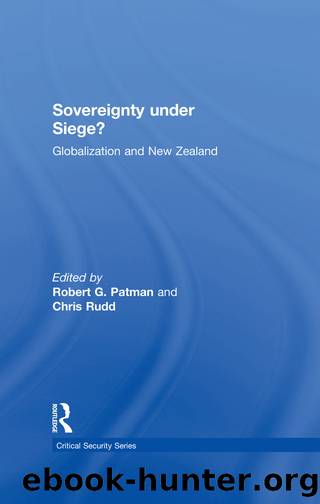Sovereignty Under Siege?: Globalization and New Zealand by Chris Rudd & Robert G. Patman

Author:Chris Rudd & Robert G. Patman [Rudd, Chris & Patman, Robert G.]
Language: eng
Format: epub
ISBN: 9781138277526
Google: P2nkAQAACAAJ
Goodreads: 34703082
Publisher: Routledge
Published: 2017-03-29T13:58:23+00:00
It is the harmonizing of all these elements that represents the challenge for 21st-century AotearoaâNew Zealand. The humanizing of the political and economic institutions and structures of AotearoaâNew Zealand will be MÄori peopleâs greatest contribution to the present and the future. I suggest that the task of harmonizing and humanizing societies is a contribution to be offered by all indigenous communities.
The task is immense. One MÄori theologian and philosopher, MÄori Marsden (1991: 9), has pointed out that MÄori have been dominated by Western humanistic philosophies, which contain faults in metaphysical analysis. He argued that:
Liberalism into whose morass we have been plunged in modern times is simply another name for confusion as to what our convictions really are. Mind and heart are at war with one another, and not, as commonly asserted, reason and faith.
According to Marsden (1991: 17), the period of the âEnlightenmentâ plunged the world into darkness. The presuppositions of science elevated sense-perception and pragmatism above spiritual truth and insights; Freudian psychology relegated the highest manifestations of life, including religion, to the dark stirrings of the subconscious mind resulting from unfulfilled incest wishes of childhood; relativism denied all absolutes, norms, values, and standards; positivism maintained that valid knowledge is obtainable only through the scientific method, and that no knowledge is genuine unless based upon observable fact.
On the question of maintaining indigenous spirituality (wairuatanga) as a basis for cultural integrity, identity and action in the world, Marsden refers again to the flaws in Western thought that has dominated Anglo-Saxon outpost societies like New Zealand. In his critique of Western philosophy, Marsden asserts the significant contribution that indigenous thought and experience could bring to the region and to the process of globalization, helping to offset any implicit hegemony.
Mäori, in common with other indigenous peoples, offer an alternative world view and approach to life to that currently in place in New Zealand and the West in general. Part of this approach involves a world view with cosmic dimensions that can inform us about nature and the use of natural resources, about the unity of the material and metaphysical worlds, and about what it means to be human. For MÄori, the universe is not a closed system, but rather it is a cosmos forever unfolding. It is expressed in the traditional and ancient saying from our ancestors quoted above: âI te kore, ki te pÅ, ki te ao mÄ ramaâ â âout of the primal power of the cosmos, through the night, into the world of lightâ (Shirres, 1998: 118-19). It is the task of the community to continually work through states of te kore, te pÅ and to seek te ao mÄ rama. From where we stand, globalization and its impact on local cultures may well be a step towards either the world of confusion (te pÅ ), or the world of light (te ao mÄ rama), or produce both confusion and enlightenment. A religious-cultural world view such as that espoused by Polynesian MÄori is relevant to any discussion of culture, economics
Download
This site does not store any files on its server. We only index and link to content provided by other sites. Please contact the content providers to delete copyright contents if any and email us, we'll remove relevant links or contents immediately.
Spell It Out by David Crystal(36110)
Life for Me Ain't Been No Crystal Stair by Susan Sheehan(35804)
Cecilia; Or, Memoirs of an Heiress — Volume 1 by Fanny Burney(32548)
Cecilia; Or, Memoirs of an Heiress — Volume 2 by Fanny Burney(31947)
Cecilia; Or, Memoirs of an Heiress — Volume 3 by Fanny Burney(31932)
The Great Music City by Andrea Baker(31917)
Professional Troublemaker by Luvvie Ajayi Jones(29651)
The Secret History by Donna Tartt(19053)
We're Going to Need More Wine by Gabrielle Union(19034)
Twilight of the Idols With the Antichrist and Ecce Homo by Friedrich Nietzsche(18625)
All the Missing Girls by Megan Miranda(15959)
Cat's cradle by Kurt Vonnegut(15338)
Pimp by Iceberg Slim(14488)
Bombshells: Glamour Girls of a Lifetime by Sullivan Steve(14057)
For the Love of Europe by Rick Steves(13915)
Talking to Strangers by Malcolm Gladwell(13350)
Norse Mythology by Gaiman Neil(13349)
Fifty Shades Freed by E L James(13233)
The Social Justice Warrior Handbook by Lisa De Pasquale(12187)
